- Home
- David Eddings
The Rivan Codex Page 2
The Rivan Codex Read online
Page 2
And when I had finished and drowsed over my plate, he spoke again. ‘Wilt thou sleep now, boy?’
‘A corner, Master,’ I said. ‘A little out-of-the-way place by the fire, if it be not too much trouble.’
He pointed. ‘Sleep there, boy,’ he said, and at once I saw a bed which I had seen no more than the table—a great bed with huge pillows and comforters of softest down. And I smiled my thanks and crept into the bed and, because I was young and very tired, I fell asleep almost at once. But in my sleep I knew that he who had brought me in from the storm and fed me and cared for me was watching through the long snowy night, and I felt even more secure in his care.
And that began my servitude. My Master never commanded in the way other masters commanded their servants, but rather suggested or asked. Amazingly, almost in spite of myself, I found myself leaping to do his bidding. The tasks, simple at first, grew harder and harder. I began to wish I had never come to this place. Sometimes my Master would stop what he was doing to watch my labors, a bemused expression on his face. Then he would sigh and return to the things which he did and which I did not understand.
The seasons turned, marching in their stately, ordered progression as I labored endlessly at impossible tasks. Then, perhaps three—or maybe it was five—years after I had come to the tower and begun my servitude, I was struggling one day to move a huge rock which my Master felt was in his way. It would not move though I heaved and pushed and strained until I thought my limbs would crack. Finally, in a fury, I concentrated all my strength and all my will upon the boulder and grunted one single word. ‘Move,’ I said.
And it moved—not grudgingly with its huge, inert weight sullenly resisting my strength—but quite easily, as if the touch of one finger would be sufficient to send it bounding across the plain.
‘Well, boy,’ my Master said, startling me by his nearness, ‘I had wondered how long it might be before this day arrived.’
‘Master,’ I said, confused, ‘what happened? How did the great rock move so easily?’
‘It moved at thy command, boy. Thou art a man, and it is only a rock.’
‘May other things be done so, Master?’
‘All things may be done so, boy. Put but thy will to that which thou wouldst have come to pass and speak the word. It shall come to pass even as thou wouldst have it. I have marveled, boy, at thine insistence upon doing all things with thy back instead of thy will. I had begun to fear for thee, thinking that perhaps thou mightest be defective.’
I walked over to the rock and laid my hands on it again. ‘Move,’ I commanded, bringing my will to bear on it, and the rock moved as easily as before.
‘Does it make thee more comfortable touching the rock when thou wouldst move it, boy?’ my Master asked, a note of curiosity in his voice.
The question stunned me. I looked at the rock. ‘Move,’ I said tentatively. The rock did not move.
‘Thou must command, boy, not entreat.’
‘Move!’ I roared, and the rock heaved and rolled off with nothing but my will and the word to make it do so.
‘Much better, boy,’ my Master said. ‘Perhaps there is hope for thee yet. What is thy name, boy?’
‘Garath,’ I told him, and suddenly realized that he had never asked me before.
‘An unseemly name, boy. I shall call thee Belgarath.’
‘As it please thee, Master,’ I said. I had never ‘thee’d’ him before, and I held my breath for fear that he might be displeased, but he showed no sign that he had noticed. Then, made bold by my success, I went further. ‘And how may I call thee, Master?’ I said.
‘I am called Aldur,’ he said, smiling.
I had heard the name before, and I immediately fell upon my face before him.
‘Art thou ill, Belgarath?’ he asked.
‘Oh, great and powerful God,’ I said, trembling, ‘forgive mine ignorance. I should have known thee at once.’
‘Don’t do that,’ he said irritably. ‘I require no obeisance. Rise to thy feet, Belgarath. Stand up, boy. Thine action is unseemly.’
I scrambled up fearfully and clenched myself for the sudden shock of lightning. Gods, as all knew, could destroy at their whim those who displeased them.
‘And what dost thou propose to do with thy life now, Belgarath?’ he asked.
‘I would stay and serve thee, Master,’ I said, as humbly as I could.
‘I require no service,’ he said. ‘What canst thou do for me?’
‘May I worship thee, Master?’ I pleaded. I had never met a God before, and was uncertain about the proprieties.
‘I do not require thy worship either,’ he said.
‘May I not stay, Master?’ I pleaded. ‘I would be thy Disciple and learn from thee.’
‘The desire to learn does thee credit, but it will not be easy,’ he warned.
‘I am quick to learn, Master,’ I boasted. ‘I shall make thee proud of me.’
And then he laughed, and my heart soared. ‘Very well then, Belgarath, I shall make thee my pupil.’
‘And thy Disciple also, Master?’
‘That we will see in time, Belgarath.’
And then, because I was very young and very proud of myself and my new-found powers, I turned to a dried and brittle bush—it was midwinter at the time—and I spoke to it fervently. ‘Bloom,’ I said, and the bush quite suddenly produced a single flower. I plucked it and offered it to him. ‘For thee, Master,’ I said. ‘Because I love thee.’
And he took the flower and smiled and held it between his hands. ‘I thank thee, my son,’ he said. It was the first time he had ever called me that. ‘And this flower shall be thy first lesson. I would have thee examine it most carefully and tell me all that thou canst perceive of it.’
And that task took me twenty years, as I recall. Each time I came to him with the flower that never wilted or faded—how I grew to hate that flower—and told him what else I had learned, he said, ‘is that all, my son?’ and, crushed, I went back to my studies.
And there were many other things as well that took at least as long. I examined trees and birds, fish and beasts, insects and vermin. I devoted forty-five years to the study of grass alone.
In time it occurred to me that I was not aging as other men aged.
‘Master,’ I said one night in our chamber high in the tower as we both labored with our studies, ‘why is it that I do not grow old?’
‘Wouldst thou grow old, my son?’ he asked. ‘I have never seen much advantage in it myself.’
‘I don’t really miss it all that much, Master,’ I admitted, ‘but isn’t it customary?’
‘Perhaps,’ he said ‘but not mandatory. Thou hast much yet to learn, and one or ten or even a hundred lifetimes are not enough. How old art thou, my son?’
‘I think I am somewhat beyond three hundred years, Master.’
‘A suitable age, my son, and thou hast persevered in thy studies. Should I forget myself and call thee “Boy” again, pray correct me. It is not seemly that the Disciple of a God should be called “Boy”.’
‘I shall remember that, Master,’ I said, almost overcome with joy that he had finally called me his Disciple.
‘I was certain that thou wouldst,’ he said. ‘And what is the object of thy present study, my son?’
‘I would seek to learn why the stars fall, Master.’
‘A proper study, my son,’ he said, smiling.
‘And thou, Master,’ I asked. ‘What is thy study—if I be not overbold to ask.’
‘I am concerned with this jewel,’ he said, pointing at a moderate-sized grey stone on the table before him. ‘It may be of some curiosity in the fullness of time.’4
‘I am certain it shall, Master,’ I assured him. ‘If be worthy of thine attention, it shall surely be a curiosity at least.’ And I turned back to my study of the inconstant stars.
In time, others came to us, some by accident, as I had come, and some by intent, seeking out my Master that they might learn from hi
m. Such a one was Zedar. I came upon him one golden day in autumn near our tower. He had built a rude altar and was burning the carcass of a goat upon it. The greasy smoke from his offering was fouling the air, and he was prostrated before the altar, chanting some outlandish prayer.
‘What are you doing?’ I demanded, quite angry since his noise and the stink of his sacrifice distracted my mind from a problem I had been considering for fifteen years.
‘Oh, puissant and all-knowing God,’ he said, groveling in the dirt. ‘I have come a thousand leagues to behold thy glory and to worship thee.’
‘Puissant?’ I said. ‘Get up, man, and stop this caterwauling. I am not a God, but a man, just as you are.’
‘Art thou not the great God, Aldur?’ he asked.
‘I am Belgarath,’ I said, ‘his Disciple. What is this foolishness?’ I pointed at his altar and his smoking offering.
‘It is to please the God,’ he said, rising and dusting off his clothes. ‘Dost thou think he will find it acceptable?’
I laughed, for I did not like this stranger much. ‘I cannot think of a single thing you might have done which would offend him more,’ I said.
The stranger looked stricken. He turned quickly and reached out as if he would seize the burning animal with his bare hands to hide it.
‘Don’t be an idiot,’ I snapped. ‘You’ll burn yourself.’
‘It must be hidden,’ he said desperately. ‘I would die rather than offend Mighty Aldur.’
‘Stand out of the way,’ I told him.
‘What?’
‘Get clear,’ I said, irritably waving him off. Then I looked at his grotesque little altar, willed it away and said, ‘Go away,’ and it vanished, leaving only a few tatters of confused smoke hanging in the air.
He collapsed on his face again.
‘You’re going to wear out your clothes if you keep doing that,’ I told him, ‘and my Master will not be amused by it.’
‘I pray thee,’ he said, rising and dusting himself off again, ‘mighty Disciple of the most high Aldur, instruct me so that I offend not the God.’
‘Be truthful,’ I told him, ‘and do not seek to impress him with false show.’
‘And how may I become his Disciple as thou art?’
‘First you become his pupil,’ I said, ‘and that is not easy.’
‘What must I do to become his pupil?’ the stranger asked.
‘You must become his servant,’ I said, a bit smugly I must admit.
‘And then his pupil?’
‘In time,’ I said, smiling, ‘if he so wills.’
‘And when may I meet the God?’
And so I took him to the tower.
‘Will the God Aldur not wish to know my name?’ the stranger asked.
‘Not particularly,’ I said. ‘If you prove worthy, he will give you a name of his own choosing.’ Then I turned to the grey stone in the wall and commanded it to open, and then we went inside.
My Master looked the stranger over and then turned to me. ‘Why hast thou brought this man to me, my son?’ he asked.
‘He besought me, Master,’ I said. ‘I felt it was not my place to say him yea or nay. Thy will must decide such things. If it be that he please thee not, I shall take him outside and bid him be no more and so put an end to him and his interruption.’
‘That is unkindly said, my son,’ Aldur said sternly. ‘The Will and the Word may not be used so.’ 5
‘Forgive me, Master,’ I said humbly.
‘Thou shalt instruct him, Belgarath,’ my Master said. ‘If it should be that thou findest him apt, inform me.’
‘I will, Master,’ I promised.
‘What is thy study currently?’
‘I examine the reason for mountains, Master,’ I said.
‘Lay aside thy mountains, Belgarath, and study man instead. It may be that thou shalt find the study useful.’
‘As my Master commands,’ I said regretfully. I had almost found the secret of mountains, and I was not much enthused about allowing it to escape me. But that was the end of my leisure.
I instructed the stranger as my Master had bade me. I set him impossible tasks and waited. To my mortification, within six months he learned the secret of the Will and the Word. My Master named him Belzedar and accepted him as a pupil.
And then came the others. Kira and Tira were twin shepherd boys who had become lost and wandered to us one day—and stayed. Makor came from so far away that I could not conceive how he had even heard of my Master, and Din from so near that I wondered that his whole tribe did not come with him. Sambar simply appeared one day and sat down upon the earth in front of the tower and waited until we accepted him.
And to me it fell to instruct each of them until he found the secret of the Will and the Word—which is not a secret, after all, but lies within every man. And in time each of them became my Master’s pupil, and he named them even as he had named me. Zedar became Belzedar, Kira and Tira became Belkira and Beltira. Makor and Din and Sambar became Belmakor and Beldin and Belsambar. To each of our names our Master joined the symbol of the Will and the Word, and we became his Disciples.6
And we built other towers so that our labors and our studies should not interfere with our Master’s work or each other’s.
At first I was jealous that my Master spent time with these others, but, since time was meaningless to us anyway and I knew that my Master’s love was infinite, so that his love for the others in no way diminished his love for me, I soon outgrew that particular childishness. And also, I grew to love the others as the bonds of our brotherhood grew. I could sense their minds as they worked, and I shared their joy at each new discovery they made. Because I was the first Disciple, they often came to me as to an older brother with those things they were embarrassed to lay before our Master, and I guided them as best I could.
Thus passed a period of perhaps a thousand years, and we were content. The world beyond our Vale changed and the people also, and no more pupils came to us. It was a question I always intended to pursue but never found the time to examine. Perhaps the other Gods grew jealous and forbade their people to seek us out, or perhaps it was that in their long passage through the endless generations, men somehow lost that tiny spark that is the source of the power of Will and Word and is the lodestone that draws their spirits inevitably to the spirit of Aldur. So it was that we were seven only and were unlike any other men on earth.
And through all this time of study and learning, our Master, Aldur, labored in infinite patience with that grey stone he had shown me on the night he had accepted me as his Disciple. Once I marveled to him that he should devote so much time to it, and he laughed.
‘Truly, my son,’ he said, ‘I labored once at least so long to create a flower which is now so common that none take note of it. It blooms beside every dusty path, and men pass it by without even looking at it. But I know it is there, and I joy in its perfection.’
As I look back, I think I would give my life, which has stretched over so many years, if my Master had never conceived the idea of that grey stone which has brought so much woe into this world.
The stone, which he called a jewel, was grey (as I have said) and quite round and perhaps the size of a man’s heart. My Master found it, I believe, in the bed of a stream. To me it appeared to be a very ordinary stone, but things are concealed from me that Aldur in his wisdom perceived quite easily. It may be that there was something in the stone which he alone could see, or it may be that this ordinary grey stone became what it became because of his efforts and his will and his spirit with which he infused it. Whatever it may have been, I wish with all my heart that he had never seen it, never stooped and touched it, never picked it up.
At any rate, one day, a very long time ago, it was finished, and our Master called us together so that he might show it to us.
‘Behold this Orb,’ he told us. ‘In it lies the fate of the world.’ And the grey stone, so ordinary a thing, but which had been polished by the tou
ch of our Master’s hand for a thousand years and more, began to glow as if a tiny blue fire flickered deep within it.
And Belzedar, always quick, asked, ‘How, Great Master, can so small a thing be so important?’
And our Master smiled, and the Orb grew brighter.
Flickering dimly within it I seemed to see images. ‘The past lies herein,’ our Master said, ‘and the present and the future also. This is but a small part of the virtue of this thing which I have made. With it may man—or the earth itself—be healed—or destroyed. Whatsoever one would do, even if it be beyond the power of the Will and the Word, with this may it come to pass.’
‘Truly a wondrous thing, Master,’ Belzedar said, and it seemed to me that his eyes glittered as he spoke, and his fingers seemed to twitch.
‘But, Master,’ I said, ‘thou hast said that the fate of the world lies within this Orb of thine. How may that be?’
‘It hath revealed the future unto me, my son,’ my Master said sadly. ‘The stone shall be the cause of much contention and great suffering and great destruction. Its power reaches from where it now sits to blow out the lives of men yet unborn as easily as thou wouldst snuff a candle.’
‘It is an evil thing then, Master,’ I said, and Belsambar and Belmakor agreed.
‘Destroy it, Master,’ Belsambar pleaded, ‘before it can bring this evil to the world.’
‘That may not be,’ our Master said.
‘Blessed is the wisdom of Aldur,’ Belzedar said. ‘With us to aid him, our Master may wield this wondrous jewel for good and not ill. Monstrous would it be to destroy so precious a thing.’7
‘Destroy it, Master,’ Belkira and Beltira said as in one voice, their minds as always linked into the same thought. ‘We beseech thee, unmake this evil thing which thou hast made.’
‘That may not be,’ our Master said again. ‘The unmaking of things is forbidden. Even I may not unmake that which I have made.’
‘Who shall forbid anything to the God Aldur?’ Belmakor asked.

 The Losers
The Losers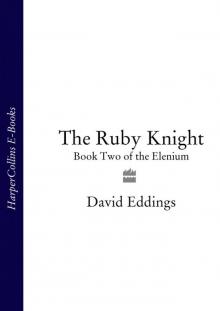 The Ruby Knight
The Ruby Knight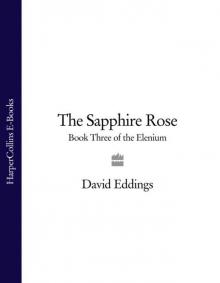 The Sapphire Rose
The Sapphire Rose King of the Murgos
King of the Murgos The Seeress of Kell
The Seeress of Kell Demon Lord of Karanda
Demon Lord of Karanda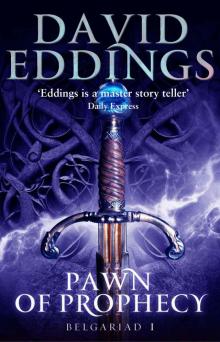 Pawn of Prophecy
Pawn of Prophecy Queen of Sorcery
Queen of Sorcery Castle of Wizardry
Castle of Wizardry Guardians of the West
Guardians of the West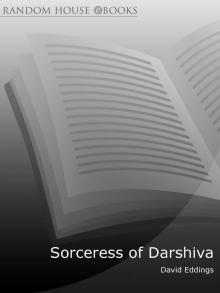 Sorceress of Darshiva
Sorceress of Darshiva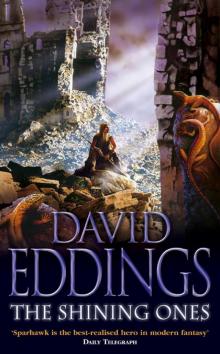 The Shining Ones
The Shining Ones Enchanters' End Game
Enchanters' End Game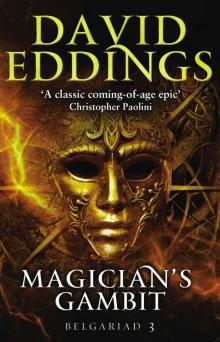 Magician's Gambit
Magician's Gambit High Hunt
High Hunt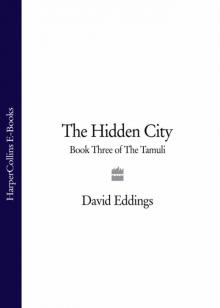 The Hidden City
The Hidden City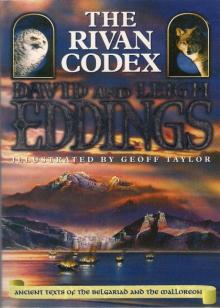 The Rivan Codex
The Rivan Codex Regina's Song
Regina's Song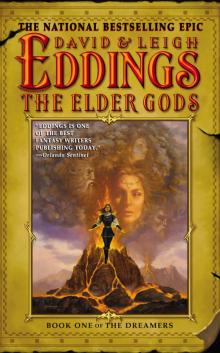 The Elder Gods
The Elder Gods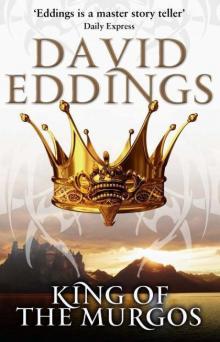 The Malloreon: Book 02 - King of the Murgos
The Malloreon: Book 02 - King of the Murgos The Malloreon: Book 05 - Seeress of Kell
The Malloreon: Book 05 - Seeress of Kell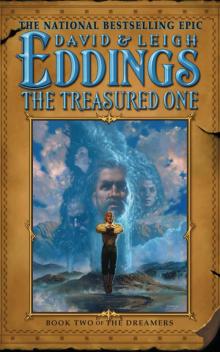 Treasured One
Treasured One The Malloreon: Book 04 - Sorceress of Darshiva
The Malloreon: Book 04 - Sorceress of Darshiva The Malloreon: Book 03 - Demon Lord Of Karanda
The Malloreon: Book 03 - Demon Lord Of Karanda Belgarath the Sorcerer and Polgara the Sorceress
Belgarath the Sorcerer and Polgara the Sorceress The Malloreon: Book 01 - Guardians of the West
The Malloreon: Book 01 - Guardians of the West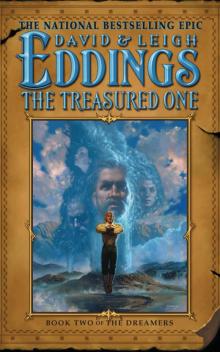 The Treasured One
The Treasured One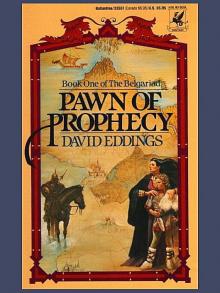 Pawn of Prophecy tb-1
Pawn of Prophecy tb-1 Polgara the Sorceress
Polgara the Sorceress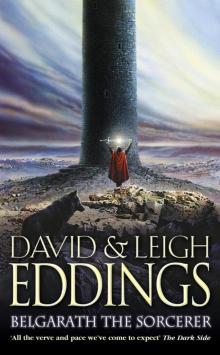 Belgarath the Sorcerer
Belgarath the Sorcerer The Younger Gods
The Younger Gods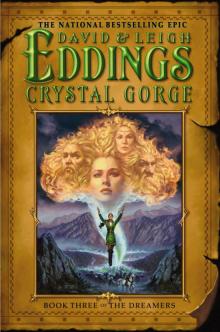 Crystal Gorge
Crystal Gorge